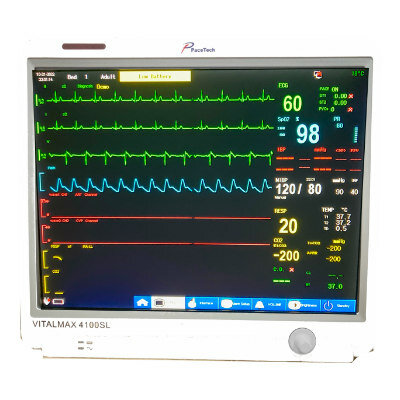Robotic Imaging Solution Detect Early COVID-19 Symptoms 
|
By HospiMedica International staff writers Posted on 02 Jun 2020 |

Image: Meditemi health robots can help detect COVID-19 symptoms (Photo courtesy of Meditemi)
An intelligent care robot provides a range of remote monitoring capabilities, including early detection of COVID-19 symptoms in under 10 seconds.
The new solution, a joint venture between Vayyar Imaging (Tel Aviv, Israel) and of Meditemi (Hong Kong), will equip Meditemi health robots with Vayyar's 4D intelligent radiofrequency (RF) sensors, which cover imaging and radar bands from 3-81Ghz, with up to 72 transceivers in each chip. When a person approaches the robot, standing within one meter of it, it performs a quick, touchless scan to analyze heart rate (BPM), respiratory rate (RPM), BPM and RPM waveforms, and temperature. The robot's dashboard then displays key vital signs in real-time, and a concomitant COVID-19 infection risk level.
The intelligent robots can function in any environmental condition, unaffected by line-of-sight, lighting or weather conditions, bringing a holistic COVID detection solution to the community that can restore confidence by providing a fast, automatic screening process in any public space, for example in building entrances, factories, public transport, airports, trade shows and border crossings. Zero staff involvement or sanitation requirements are involved. In addition, Meditemi robots will enable seniors monitoring in their residences and alert caregivers of emergency situations (such as falls) or health deterioration.
“Vayyar's multi-antenna sensor produces unprecedented levels of accuracy, enabling high-resolution 4D point-cloud images. Vayyar is developing the next generation of sensing technology that is miniature, affordable and versatile enough to impact everyone's lives,” said Ofer Familier, General Manager of Vayyar Home. “Following successful collaborations with Israel's Ministries of Defense and Health, we are thrilled to be coupling our health sensor technology with Meditemi to provide solutions to bring people back to work and also help monitor our parents and grandparents at their homes.”
“Meditemi robot together with Vayyar technology will help doctors and nurses in providing treatment and giving advice to patients without touching or getting close to the patient, in order to reduce virus infection risks for medical personnel,” said Rafael Aviram, President and CEO of Meditemi.
The rapidly ageing population is bringing new challenges to society worldwide. Care institutions and hospitals are facing serious staffing shortages, as fewer and fewer people choose to become healthcare professionals, while at the same time the number of people suffering from morbidities is constantly on the rise.
Related Links:
Vayyar Imaging
Meditemi
The new solution, a joint venture between Vayyar Imaging (Tel Aviv, Israel) and of Meditemi (Hong Kong), will equip Meditemi health robots with Vayyar's 4D intelligent radiofrequency (RF) sensors, which cover imaging and radar bands from 3-81Ghz, with up to 72 transceivers in each chip. When a person approaches the robot, standing within one meter of it, it performs a quick, touchless scan to analyze heart rate (BPM), respiratory rate (RPM), BPM and RPM waveforms, and temperature. The robot's dashboard then displays key vital signs in real-time, and a concomitant COVID-19 infection risk level.
The intelligent robots can function in any environmental condition, unaffected by line-of-sight, lighting or weather conditions, bringing a holistic COVID detection solution to the community that can restore confidence by providing a fast, automatic screening process in any public space, for example in building entrances, factories, public transport, airports, trade shows and border crossings. Zero staff involvement or sanitation requirements are involved. In addition, Meditemi robots will enable seniors monitoring in their residences and alert caregivers of emergency situations (such as falls) or health deterioration.
“Vayyar's multi-antenna sensor produces unprecedented levels of accuracy, enabling high-resolution 4D point-cloud images. Vayyar is developing the next generation of sensing technology that is miniature, affordable and versatile enough to impact everyone's lives,” said Ofer Familier, General Manager of Vayyar Home. “Following successful collaborations with Israel's Ministries of Defense and Health, we are thrilled to be coupling our health sensor technology with Meditemi to provide solutions to bring people back to work and also help monitor our parents and grandparents at their homes.”
“Meditemi robot together with Vayyar technology will help doctors and nurses in providing treatment and giving advice to patients without touching or getting close to the patient, in order to reduce virus infection risks for medical personnel,” said Rafael Aviram, President and CEO of Meditemi.
The rapidly ageing population is bringing new challenges to society worldwide. Care institutions and hospitals are facing serious staffing shortages, as fewer and fewer people choose to become healthcare professionals, while at the same time the number of people suffering from morbidities is constantly on the rise.
Related Links:
Vayyar Imaging
Meditemi
Latest Health IT News
- Machine Learning Model Improves Mortality Risk Prediction for Cardiac Surgery Patients
- Strategic Collaboration to Develop and Integrate Generative AI into Healthcare
- AI-Enabled Operating Rooms Solution Helps Hospitals Maximize Utilization and Unlock Capacity
- AI Predicts Pancreatic Cancer Three Years before Diagnosis from Patients’ Medical Records
- First Fully Autonomous Generative AI Personalized Medical Authorizations System Reduces Care Delay
- Electronic Health Records May Be Key to Improving Patient Care, Study Finds
- AI Trained for Specific Vocal Biomarkers Could Accurately Predict Coronary Artery Disease
- First-Ever AI Test for Early Diagnosis of Alzheimer’s to Be Expanded to Diagnosis of Parkinson’s Disease
- New Self-Learning AI-Based Algorithm Reads Electrocardiograms to Spot Unseen Signs of Heart Failure
- Autonomous Robot Performs COVID-19 Nasal Swab Tests

- Statistical Tool Predicts COVID-19 Peaks Worldwide
- Wireless-Controlled Soft Neural Implant Stimulates Brain Cells
- Tiny Polymer Stent Could Treat Pediatric Urethral Strictures
- Human Torso Simulator Helps Design Brace Innovations
- 3D Bioprinting Rebuilds the Human Heart
- Nanodrone Detects Toxic Gases in Hazardous Environments
Channels
Artificial Intelligence
view channel
AI-Powered Algorithm to Revolutionize Detection of Atrial Fibrillation
Atrial fibrillation (AFib), a condition characterized by an irregular and often rapid heart rate, is linked to increased risks of stroke and heart failure. This is because the irregular heartbeat in AFib... Read more
AI Diagnostic Tool Accurately Detects Valvular Disorders Often Missed by Doctors
Doctors generally use stethoscopes to listen for the characteristic lub-dub sounds made by heart valves opening and closing. They also listen for less prominent sounds that indicate problems with these valves.... Read moreCritical Care
view channel
Deep-Learning Model Predicts Arrhythmia 30 Minutes before Onset
Atrial fibrillation, the most common type of cardiac arrhythmia worldwide, affected approximately 59 million people in 2019. Characterized by an irregular and often rapid heart rate, atrial fibrillation... Read more
Breakthrough Technology Combines Detection and Treatment of Nerve-Related Disorders in Single Procedure
The peripheral nervous system (PNS) serves as the communication network that links the brain and spinal cord to every other part of the body. It consists of two parts: the somatic nervous system, which... Read moreSurgical Techniques
view channel
Hydrogel-Based Miniaturized Electric Generators to Power Biomedical Devices
The development of engineered devices that can harvest and convert the mechanical motion of the human body into electricity is essential for powering bioelectronic devices. This mechanoelectrical energy... Read moreWearable Technology Monitors and Analyzes Surgeons' Posture during Long Surgical Procedures
The physical strain associated with the static postures maintained by neurosurgeons during long operations can lead to fatigue and musculoskeletal problems. An objective assessment of surgical ergonomics... Read more.jpg)
Custom 3D-Printed Orthopedic Implants Transform Joint Replacement Surgery
The evolving field of 3D printing is revolutionizing orthopedics, especially for individuals requiring joint replacement surgeries where traditional implants fail to provide a solution. Although most people... Read more
Cutting-Edge Imaging Platform Detects Residual Breast Cancer Missed During Lumpectomy Surgery
Breast cancer is becoming increasingly common, with statistics indicating that 1 in 8 women will develop the disease in their lifetime. Lumpectomy remains the predominant surgical intervention for treating... Read moreHealth IT
view channel
Machine Learning Model Improves Mortality Risk Prediction for Cardiac Surgery Patients
Machine learning algorithms have been deployed to create predictive models in various medical fields, with some demonstrating improved outcomes compared to their standard-of-care counterparts.... Read more
Strategic Collaboration to Develop and Integrate Generative AI into Healthcare
Top industry experts have underscored the immediate requirement for healthcare systems and hospitals to respond to severe cost and margin pressures. Close to half of U.S. hospitals ended 2022 in the red... Read more
AI-Enabled Operating Rooms Solution Helps Hospitals Maximize Utilization and Unlock Capacity
For healthcare organizations, optimizing operating room (OR) utilization during prime time hours is a complex challenge. Surgeons and clinics face difficulties in finding available slots for booking cases,... Read more
AI Predicts Pancreatic Cancer Three Years before Diagnosis from Patients’ Medical Records
Screening for common cancers like breast, cervix, and prostate cancer relies on relatively simple and highly effective techniques, such as mammograms, Pap smears, and blood tests. These methods have revolutionized... Read morePoint of Care
view channel
Critical Bleeding Management System to Help Hospitals Further Standardize Viscoelastic Testing
Surgical procedures are often accompanied by significant blood loss and the subsequent high likelihood of the need for allogeneic blood transfusions. These transfusions, while critical, are linked to various... Read more
Point of Care HIV Test Enables Early Infection Diagnosis for Infants
Early diagnosis and initiation of treatment are crucial for the survival of infants infected with HIV (human immunodeficiency virus). Without treatment, approximately 50% of infants who acquire HIV during... Read more
Whole Blood Rapid Test Aids Assessment of Concussion at Patient's Bedside
In the United States annually, approximately five million individuals seek emergency department care for traumatic brain injuries (TBIs), yet over half of those suspecting a concussion may never get it checked.... Read more
New Generation Glucose Hospital Meter System Ensures Accurate, Interference-Free and Safe Use
A new generation glucose hospital meter system now comes with several features that make hospital glucose testing easier and more secure while continuing to offer accuracy, freedom from interference, and... Read moreBusiness
view channel
Johnson & Johnson Acquires Cardiovascular Medical Device Company Shockwave Medical
Johnson & Johnson (New Brunswick, N.J., USA) and Shockwave Medical (Santa Clara, CA, USA) have entered into a definitive agreement under which Johnson & Johnson will acquire all of Shockwave’s... Read more
















